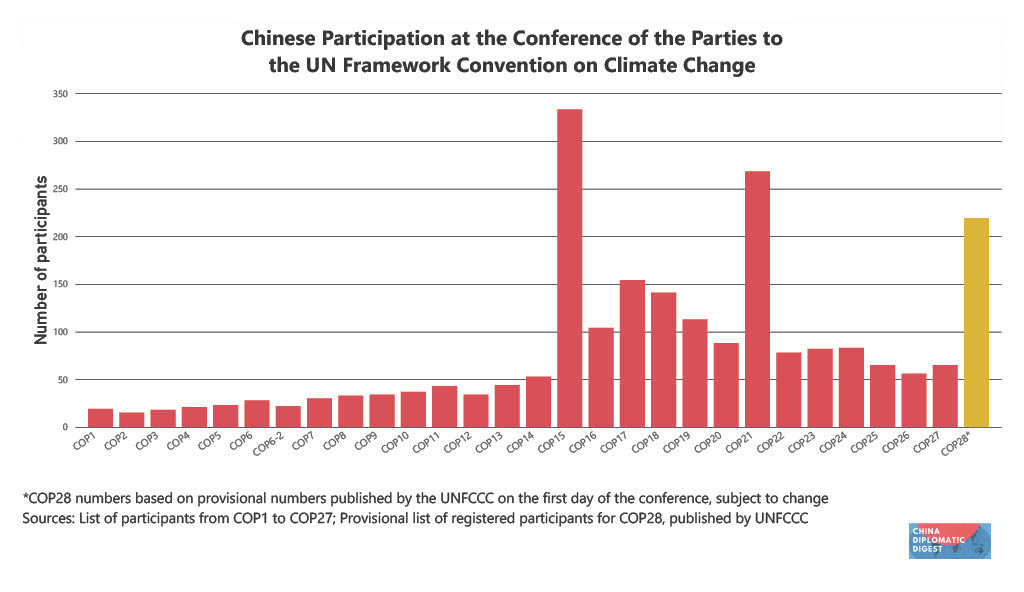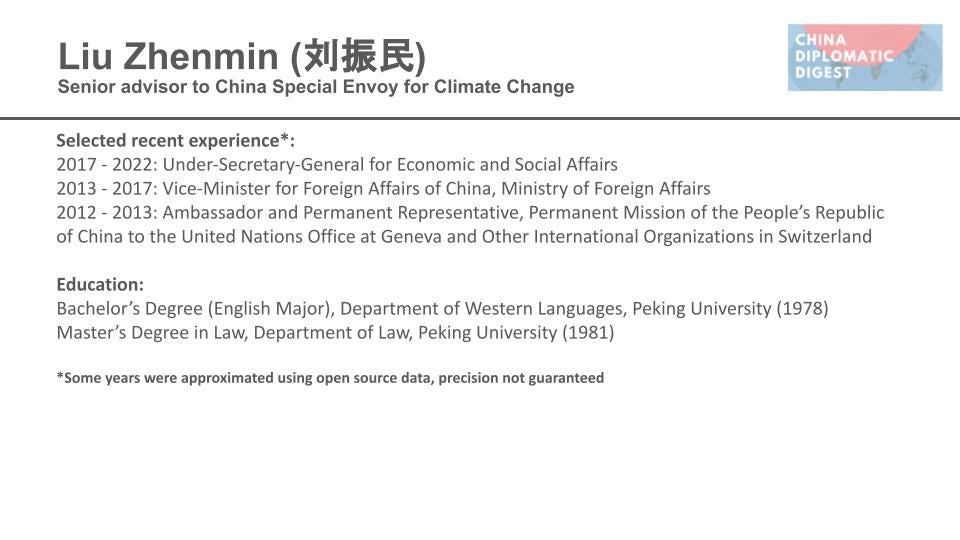China's strong showing at COP post-pandemic
Analysis of China's delegation at COP28
The 28th Conference of the Parties to the UN Framework Convention on Climate Change (COP28) is currently being held in Dubai, United Arab Emirates. This year, at least according to the provisional list of registered participants, China’s delegation is the largest it has been since COP21, with 219 people registered. Whilst this number is subject to change when the final list is released at the end of the conference, China’s final list has usually remained mostly unchanged in recent years.
For some context, from COP1 to COP17, the typical size of China's delegation trended upwards. However, from COP18 onwards, the number of Chinese delegates attending the conference began to slowly decrease. The only times that this trend was not followed was at COP15 in Copenhagen and at COP21 in Paris, where the size of China's delegation spiked noticeably. Expectations were high for both COP15 and COP21, and whilst the former failed to produce anything of substance, the latter culminated with the signing of the Paris Agreement.
As the world’s largest producer of greenhouse gases and a leading investor in renewables, it is important to track China’s engagement with COP.
In another sign that China is placing more political importance on COP28 is the presence of First Vice-Premier and Politburo Standing Committee Member Ding Xuexiang, the most senior Chinese government and party official to attend COP since Paris 2015.
Whilst, in comparison, China’s COP28 delegation is only the 34th largest by size, the relative increase from last year shows that China is indeed more engaged this year. This year’s COP is also the first since the lifting of China’s ‘zero covid’ policy, which will have had an impact on the previous two years’ attendance levels, however as the above graph shows, China’s attendance was low before the pandemic.
Attendance is higher across the board this year, with over 24,000 registered official participants (there are also approximately 27,000 ‘overflow’ participants registered that are not part of an official country delegation). To put these numbers into perspective, the previous record holder, COP21, ‘only’ had 19,201 official delegates in attendance.
Li Shuo, incoming Director of the China Climate Hub at the Asia Society Policy Institute, suggests that whilst foreign policy shifts and domestic developments may result in Chinese negotiators taking “a more combative tone on sensitive issues such as fossil fuel phaseout”, China’s sense of accountability “to both domestic and global stakeholders” and concern for how it is perceived by the Global South may help push China to join in consensus.
Looking at the breakdown of China’s official delegation, it is unsurprising to see that China’s foreign affairs and environmental organisations are the most represented. An important change from previous years, however, is the size of the Ministry of Ecology and Environment (MEE) cohort. Indeed, since the ministry took the lead on tackling China’s climate change issues after its creation in 2018, very few people registered as MEE staff have attended COP. This year, however, MEE staff make up 12% of the total delegation.
Leading China’s delegation this year is Zhao Yingmin, Vice Minister of the MEE, who took over from Xie Zhenhua as head of the delegation in 2019. Serving as deputy head is Xia Yingxian, Director of the MEE’s Department of Climate Change.
Xie Zhenhua is back once again this year as China’s Special Envoy for Climate Change Affairs. Xie has been an important and consistent figure behind China’s engagement on climate change issues, and led the Chinese delegation at COP from 2007 to 2018.
Serving as Xie’s Senior Advisor is Liu Zhenmin, a former Vice-Minister for Foreign Affairs who is rumoured to be the next Special Envoy for Climate Change once Xie retires.
Please see below for more information on the above-mentioned delegates.
In short, China’s re-engagement with COP post-pandemic has seen an increase in Chinese delegates at COP, and amongst them are some of China’s most experienced negotiators. Whilst the final outcome of COP28 is not yet known, it is clear that China is taking this year’s negotiations more seriously.







